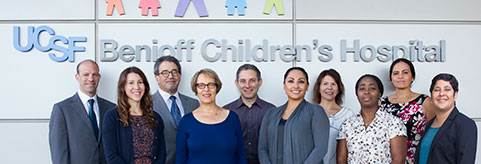22q Deletion
Velocardiofacial syndrome, or VCFS, is a complex syndrome that has been associated with more than 30 different characteristics, including defects of the palate, heart defects, learning disabilities and distinct facial features. The severity of VCFS and the characteristics that appear vary widely between individuals. It's inherited in an autosomal dominant fashion, meaning if one parent has the syndrome, each child has a 50 percent chance of inheriting it.
The name comes from the Latin words velum, meaning palate, cardia, meaning heart, and facies, meaning face. The condition is also known as Shprintzen syndrome, DiGeorge syndrome or 22q11 Deletion syndrome.
Because symptoms vary from case to case, it's important for children with VCFS to be evaluated by a knowledgeable team of specialists so nothing is overlooked.
VCFS has been associated with more than 30 different characteristics, none of which occur in all cases. The more common signs include:
- Cleft palate
- Heart problems
- Long face
- Nose with a bulbous tip and small nostrils
- Immune system problems
- Long fingers
- Speech disturbance
- Dental decay
For some children with VCFS, the condition is detected during a physical exam at birth, but in other cases it is not suspected until later in life. In all patients, the diagnosis is confirmed with genetic testing.
Children with VCFS should be seen by a nurse from the Craniofacial Center, shortly after birth, to ensure they can feed and breathe adequately. Within the first two months of life, they should be seen for a full craniofacial team evaluation.
Children with VCFS can have a range of characteristics, which will dictate the proper treatment. If a child has a cleft palate, it should be repaired at the usual time, when the infant is around 10 months old or starting to make sounds of speech.
If there's evidence of developmental delay, the child should be referred to an infant stimulation program to receive thorough developmental testing and appropriate interventions. In California, parents should contact their local Department of Developmental Services regional center, which can help you access and coordinate special services for children with developmental delays. Such programs are available to all eligible children regardless of income.
Speech problems are common in VCFS, and many patients require speech therapy.
A child with VCFS may encounter social and emotional challenges unique to this condition. Support organizations and resources are available for children and their families — see our listings in Other Resources, particularly the VCFS Educational Foundation.
Reviewed by health care specialists at UCSF Benioff Children's Hospital.
Other Resources
- VCFS Educational Foundation
- AboutFace
- California Children's Services
- California Dept. of Developmental Services: Regional Center Directory
- Changing Faces
- Children's Craniofacial Association
- Cleft Advocate
- Cleft Palate Foundation
- FACES: The National Craniofacial Association
- Family Voices
- Parents Helping Parents
- Support for Families of Children with Disabilities
- Woodbine House Special Needs Books
Reviewed by health care specialists at UCSF Benioff Children's Hospital.


